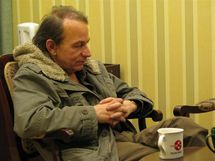Edgy writer Houellebecq wins France's top book prize
Myriam Chaplain-Riou
PARIS, Myriam Chaplain-Riou- France's best-known writer Michel Houellebecq won its top literary prize Monday for a best-selling satire of art and celebrity, fans hailing it as an overdue honour for his edgy, sex-charged writing.
Houellebecq came close to winning in 1998 and 2005 but has divided readers and critics with dark tales that have drawn accusations of obscenity and racial provocation.

Houellebecq
"It's a weird feeling but I am deeply happy," Houellebecq told reporters afterwards.
"Some people only follow contemporary literature thanks to the Goncourt, and literature is not French people's main concern, so this is very useful."
"La carte et le territoire" (The Map and the Territory) satirises the Paris art and celebrity world in the tale of Jed Martin, an artist who gains global fame by photographing old Michelin maps.
It softens the misanthropic tone of his four previous novels, but skewers with dry humour a number of real-life personalities, even featuring a drunken, stinking, badly-dressed writer named Michel Houellebecq.
Liberation newspaper called it a "masterpiece", though the critic Pierre Asouline in Le Monde complained that it lacked depth despite a good style.
It has sold well in spite of a row over accusations of plagiarism, which the author has dismissed as "ridiculous".
"It's perhaps the easiest-to-read of my books," Houellebecq said. "Certainly the most complex in structure."
In the English-speaking world Houellebecq has been compared to the American Bret Easton-Ellis and Britain's Martin Amis, whose novels likewise feature highly-sexed anti-heroes. The latter's 1984 novel "Money" similarly introduced a character named Martin Amis.
Houellebecq receives a symbolic cheque for 10 euros from the Goncourt Academy, but the prize is said to guarantee average sales of 400,000 copies and has become a seal of approval for France's top authors.
"Atomised" narrowly missed out on a Goncourt in 1998, prompting Houellebecq to accuse the judges of taking bribes, boosting his reputation for grumpiness.
"Why not me?" he complained in an interview with Liberation at the time.
Another work, "The Possibility of an Island", came within one vote of a Goncourt win in 2005.
In 2001, "Platform" landed him in court on charges over his depiction of Islam, but he was cleared of all charges. He now divides his time between Spain and Ireland.
The plagiarism claim over his latest book centred on three factual passages that were apparently lifted almost word-for-word from Wikipedia, the user-generated online encyclopedia.
The author dismissed the accusation, arguing that mixing existing texts into fiction was a technique countless writers have used.
To survive the Goncourt Academy's 13-round voting process he beat off competition from Virginie Despentes, whose punk novel "Apocalypse Baby" won two votes from the jury.
Despentes, 41, another literary wild child who writes violent and erotic novels in urban dialect, instead scooped the Renaudot prize, also awarded on Monday, considered the next best thing to the Goncourt.
While most French critics praised "The Map and the Territory", one writer on the Goncourt jury -- the French-Moroccan novelist Tahar Ben Jelloun -- said he wasted three days reading it.
One of Houellebecq's fans, Socialist Party leader Martine Aubry, said the prize rewarded the "modernity and topicality" of all his work.
Assouline wrote in his literary blog for Le Monde: "If the Goncourt jury had not crowned him this time, they would have looked ridiculous."
-----------------------------------------------------------------------------